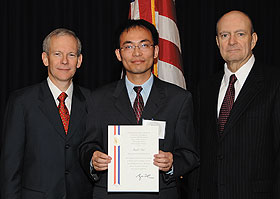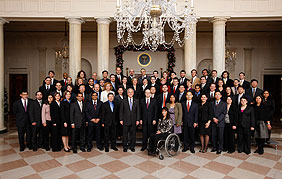  |
| HOME | THIS ISSUE | CALENDAR | GRANTS | BACK ISSUES | < BACK | NEXT > |
Engineering professor earns presidential award for underwater communications research by Colin Poitras - January 20, 2009 |
||||
| Shengli Zhou, director of the University’s Wireless Communication Research Laboratory, has received a prestigious presidential award for his work on improving the efficiency of underwater acoustic communications. Zhou was one of 67 researchers nationwide to receive the Presidential Early Career Award for Scientists and Engineers during a Dec. 19 ceremony in Washington D.C. The award is the nation’s highest honor for professionals at the outset of their independent scientific research careers. An assistant professor of electrical and computer engineering, Zhou is believed to be the first UConn faculty member to receive such a distinction. “The PECASE is the most prestigious award available to a young faculty member,” says Mun Y. Choi, dean of the School of Engineering. “This award underscores the high quality of the faculty members in the School of Engineering, and attests to the long-term importance of the work Prof. Zhou is conducting with Prof. Jun-Hong Cui in the area of remote underwater sensing. All of UConn can take pride in this honor.” The awards are presented by the White House Office of Science and Technology Policy. Nine federal departments and agencies annually submit nominations on behalf of scientists and engineers whose work shows exceptional promise for leadership at the frontiers of scientific knowledge. Zhou was among 15 scholars nominated by officials at the U.S. Department of Defense. Innovative algorithms Communicating and transferring data under water present unique obstacles in naval operations, scientific exploration, and commercial industry. Radio communications, which work so effectively on land, do not work as well under water so they must be replaced by acoustic communications. Due to the challenging characteristics of underwater channels, current acoustic communication technologies are extremely slow. Zhou has conducted extensive research on broadband wireless communications over radio channels in the past, but has focused on underwater acoustic communications during the past four years.
He is currently working on the creation of innovative algorithms to address the special challenges encountered in underwater acoustic communications. Zhou says the fact that the presidential award honors advances in both science and engineering reflects the widespread applications associated with his research. “With this technology, if you have the right links available, you can facilitate all different kinds of operations,” he says. Some examples of the practical applications of Zhou’s research include improved naval submarine communication with land-based operations, networking of autonomous underwater vehicles for cooperative missions, coastline defense monitoring, and various scientific applications involving long-term aquatic monitoring or short-term aquatic exploration. Zhou earned his Ph.D. at the University of Minnesota in 2002 and came to UConn in 2003. He was presented with an Office of Naval Research Young Investigator Program award in 2003, and last fall was selected as one of five recipients of the United Technologies Corporation Professorship in Engineering Innovation Award in the School of Engineering. Together with Jun-Hong Cui, he serves as co-director of the University’s Underwater Sensor Network Lab. The lab serves as a nexus for an interdisciplinary team of 20 faculty from throughout the School of Engineering, as well as from the departments of ecology and evolutionary biology and marine sciences and the National Undersea Research Center. |
| ADVANCE HOME UCONN HOME |


